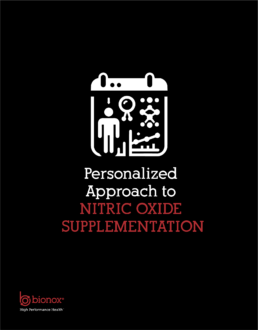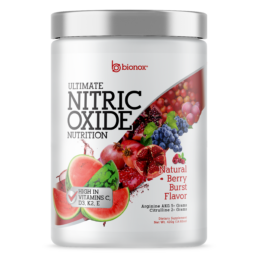How to Choose A Good Beetroot Supplement
Are you searching for a good beetroot supplement that delivers real results? Look no further than Beetroot Energy by Bionox!
In the world of heart health and blood pressure support supplements, not all products are created equal, especially beetroot products. Many beetroot powders on the market boast health benefits but fall short due to their negligible nitrate content, the very compound that makes beetroot a super-food.
What are nitrates?
Nitrates are naturally occurring compounds found in the soil and water that plants often absorb as they grow. In vegetables like beets, spinach, and arugula, nitrates are beneficial because they convert to nitric oxide in the body, which helps to relax and dilate blood vessels, improving blood flow and reducing blood pressure just to name a few of the many many amazing things it can do.
This can enhance exercise performance and cardiovascular health and so much more.
Nitrates In Bacon
In processed meats like bacon, added nitrates can form nitrosamines during high-heat cooking, which are potentially carcinogenic. This is not the same as the nitsates in beets. Consuming high amounts of these types of nitrates can increase the risk of diseases, including certain types of cancer. The key difference is in the formation of harmful compounds in processed meats, as opposed to the beneficial nitric oxide produced from vegetable nitrates.
Our Natural Nitrates
Beetroot Energy stands out from the crowd of junk beetroot products. Unlike cheaper powders that often contain little to no natural nitrates, Beetroot Energy guarantees a full 100mg of healthy, natural beetroot nitrates in every serving.
Natural nitrates are the powerhouse behind beetroot’s health-boosting properties, especially known for enhancing blood flow, improving stamina, and supporting cardiovascular health, they are a health promoting powerhouse for your body.
Unlike synthetic nitrates as mentioned above, which are commonly found in processed meats and have a notorious reputation for health risks, the natural nitrates in Beetroot Energy are derived from beets grown in nitrate-rich soil, ensuring their efficacy and safety. With Beetroot Energy, you don’t just get a supplement; you get the full spectrum of beetroot’s advantages in a delicious, convenient cherry tart that requires no preparation or mixing.
Potent Natural NO Simulators
Beetroot Energy’s nitrate-rich formula is designed to increase vasodilation, enhancing not just muscle strength and endurance but also promoting better skin tone and cognitive function. It’s a versatile supplement that fits seamlessly into your daily routine, providing sustained energy whether you’re at the gym or powering through your workday.
In the health and wellness world, many of the most poorly made beetroot supplements are lauded for their potential benefits, including improved stamina and cardiovascular health. While it’s true beetroot can do those things, their cheap products lack the critical element that makes those things happen.
The critical factor often overlooked in these supplements: the actual nitrate content. Nitrates as mentioned already are the powerhouse behind beetroot’s health benefits, and unfortunately, many supplements on the market fall short in delivering these vital compounds.
Understanding Beetroot Supplements: The Nitrate Dilemma Different farming methods product different amounts on nitrates. The care, feeding and growing of higher nitrate beets costs more money, so most companies do not use these more expensive beets. They use beets with almost ZERO nitrates content.
The Low Down on Junk Beetroot Supps
Capsules
- Capsules are a popular form of beetroot supplements, convenient for those on the go. However, many of these capsules contain merely dried and ground beetroot, which significantly lacks in nitrate content compared to fresh or properly processed and grown options. Look to see if you can see nitrate amount listed on package. You almost never will. Why? Because it’s ZERO, ZILCH.
Powders
- Beetroot powders are another common supplement choice for many. Marketed for their ease of use in shakes and smoothies, they suffer a similar fate to capsules. The drying process can reduce nitrate levels, and some brands add fillers, further diluting the potential health benefits.
Drinks
- Ready-to-drink beetroot juices and concentrates might seem like a good source of nitrates, but the devil is in the details. Many of these drinks are not only diluted but also contain added sugars and preservatives, undermining the nutritional value of the beetroot itself.
The Inconvenient Truth: Beetroot as a Filler
- Beetroot’s cost-effectiveness has led to its use as a filler ingredient, even in products like dog food. This speaks volumes about its abundance and affordability but raises questions about the quality and efficacy of beetroot in many supplements. THis dog food grade beetroot is what most companies are selling you!
Seeking Genuine Nutrition: What to Look for in Beetroot Supplements
- When searching for a beetroot supplement, the key is to look for products that specify their nitrate content. Supplements that use concentrated beetroot extract or those processed to retain nitrates are more likely to deliver the health benefits associated with beetroot.
The world of beetroot supplements is riddled with products that capitalize on the vegetable’s healthy image without delivering its full benefits. As consumers, it’s crucial to understand the difference between mere beetroot presence and the actual delivery of nitrates. By choosing supplements with specified nitrate content, we can ensure that we’re not just falling for marketing hype but genuinely investing in our health.
Use The Right Kind Of Beets!
Many people find it challenging to incorporate beetroot into their diets due to its strong, sometimes nasty, earthy taste which can be quite overpowering. This can make it hard for some to enjoy the benefits of beetroot, despite its terrific and powerful health advantages.
Bionox’s Beetroot Energy lozenges, referred to as tarts, offer a palatable alternative. They are infused with a natural cherry flavor that transforms the typically robust taste of beetroot into a delightful treat. This makes it easier and more enjoyable for individuals to consume beetroot and gain its cardiovascular and endurance benefits without having to deal with its naturally strong flavor.
When to take Beetroot Energy?
The best time to take Beetroot Energy tarts is in between meals, perhaps 20 minutes before or after eating. This timing allows the body to optimally break down the beneficial ingredients in Beetroot Energy for maximum absorption. Taking apple cider vinegar before consuming may also help according to some research.
Is It Safe?
Beetroot Energy tarts are safe for most individuals, unless you have an allergy to beets, they present a clean and easy way to support your health.
Are There Studies on Beetroot?
Regarding studies, nitrates found in vegetables like beetroot have been studied extensively. Research suggests that dietary nitrates can lower blood pressure, improve athletic performance, and enhance blood flow due to their conversion to nitric oxide in the body.
Here are some links to a few studies on nitrates.
Increasing vegetable intake to obtain the health promoting and ergogenic effects of dietary nitrate” from the European Journal of Clinical Nutrition: Study Link. This study discusses the benefits of increased dietary nitrate intake from vegetables, highlighting its cardio-protective effects and improvement in exercise performance.
Nitrate containing vegetables and dietary nitrate and nonalcoholic fatty liver disease: a case control study” from the Nutrition Journal: Study Link. This study explores the relationship between dietary nitrate intake from vegetables and nonalcoholic fatty liver disease.
Nitric Oxide & Dietary Nitrate: Another Reason to Eat Your Vegetables” – Center for Nutrition Studies: Study Link. This article discusses the relationship between dietary nitrate and nitric oxide, emphasizing the importance of eating vegetables for health benefits.
When it comes to choosing a Good Beetroot Supplement, it’s essential to consider the nitrate content, as this is the key component that contributes to the health benefits of beetroot. Many products on the market claim to offer the advantages of beetroot, but few deliver the necessary nitrate levels. In our comprehensive guide, we’ll explore what makes a beetroot supplement effective and how to identify the ones that truly offer the benefits they claim.
Choosing the Right Beetroot Supplement
Benefits
Increased and sustained energy
Supports increased strength and endurance
Oxalate free, natural, tested and safe
Increases vasodilation for harder, more vascular-looking muscles (great for gym pumps)
Increased blood flow supports improvements in health, cognition, and skin tone and tightness
Convenience and Taste
Unlike beetroot powders, Beetroot Energy is an easy-to-use, delicious cherry tart that requires no mixing or preparation. Our natural cherry flavor is fantastic and is loved by our customers!
A Personalized Heart Health Diet and Supplement Guide
Heart Health Diet Guide.
Introduction to the Heart Health Diet: Basics and Benefits
Preventing heart disease is significantly easier and more effective than treating it once it’s completely developed in your body. This is a crucial point to understand, as heart disease remains a leading cause of disease and mortality worldwide. One of the most powerful tools in preventing heart disease is, as you may already know, a healthy diet. Making simple dietary changes can also have a profound impact on your heart health.
Firstly, prevention is key because once heart disease sets in, treatment can become complex and challenging. It often involves long-term risky medication, difficult lifestyle adjustments, and, in severe cases, surgical interventions. The financial, physical, and emotional costs of treating heart disease are high. This is true not just for the individual, but also for their families and the healthcare system.
In contrast, preventive measures, particularly through diet, are relatively simple and accessible. A heart-healthy diet includes many fruits, vegetables, whole grains, and lean proteins. It also means limiting the intake of processed foods, sugars, and unhealthy fats. Incorporating such foods into your diet can help maintain a healthy weight. They help lower cholesterol levels, reduce blood pressure, and decrease the risk of type 2 diabetes—all contributing factors to heart disease.
Moreover, adopting a heart-healthy diet doesn’t have to be a drastic or unenjoyable change. It’s about making smarter food choices and being mindful of portion sizes. Simple swaps like choosing whole grains over refined ones or choosing fish or plant-based proteins instead of red meat can make a big difference.
Important Choices
The choices we make in our diet not only affect our present health but also determine our risk for heart disease in the future. It’s about creating a sustainable and enjoyable eating pattern that supports heart health over a lifetime. Prioritizing a heart-healthy diet is an investment in your long-term health. This is so because it is better to manage heart disease before as opposed to after it has developed.
Regarding heart-healthy diets, the key is to focus on foods that support cardiovascular health while being mindful of those that could be harmful. It’s important to note that some seed oils, often considered healthy, can be inflammatory. This is a nuanced area, and opinions differ, but it’s something to consider when choosing fats in your diet.
Things You Can Do
- Caloric Balance and Physical Activity: Balancing calories is fundamental. Consuming as many calories as you burn is key to maintaining a healthy weight. Regular physical activity, as recommended by the American Heart Association, includes at least 150 minutes of moderate activity or 75 minutes of vigorous activity weekly, along with muscle-strengthening activities.
- Healthy Dietary Pattern: Emphasizing a variety of fruits and vegetables, whole grains, and healthy proteins is crucial. While liquid non-tropical vegetable oils are often recommended, there’s a growing discussion about the inflammatory potential of some seed oils. It’s advisable to focus on fats known for their health benefits, like olive oil and omega-3 rich fish oils.
- Proteins: Choosing lean meats, poultry, fish, low-fat dairy products, eggs, and plant-based proteins like legumes and soy products is recommended. Fish rich in omega-3 fatty acids are particularly beneficial.
- Reducing Inflammatory Foods: While unsaturated fats from vegetable oils are often recommended, it’s important to consider the potential inflammatory effects of certain seed oils. Opting for oils known for their anti-inflammatory properties, such as olive oil, can be a better choice.
- Salt (Sodium) Intake: High salt consumption is linked to hypertension, a major risk factor for heart disease. The American Heart Association suggests limiting sodium to no more than 2,300 milligrams per day.
- Heart-Healthy Foods: A heart-healthy diet includes a variety of nonstarchy vegetables, fruits, whole grains, lean meats, and seafood. Foods rich in omega-3 fatty acids, like flaxseeds and walnuts, are also beneficial.
- Diet Plans: Popular heart-healthy diets like the Mediterranean, DASH, and Vegetarian diets emphasize fresh whole foods. They also limit processed and high-fat foods. The Mediterranean Diet, in particular, has been linked to various health benefits. The least of which is a reduced risk of heart disease.
Diet Is Key
When considering your diet, it’s essential to consult with healthcare professionals to ensure it’s appropriate for your individual health needs. The debate around seed oils and inflammation is ongoing, and staying informed about the latest research is key.
For more detailed information, you can refer to the following sources:
- American Heart Association Diet and Lifestyle Recommendations: American Heart Association
- Heart-healthy diet tips: Mayo Clinic
- Details on what constitutes a heart-healthy diet: Houston Methodist
- Overview of heart-healthy diets: CardioSmart – American College of Cardiology

The Role of Nitric Oxide in Heart Health
Nitric oxide (NO) is crucial in maintaining heart health, acting as a key regulatory molecule in the cardiovascular system. Its importance can’t be overstated, and understanding its functions can provide insights into how lifestyle and dietary choices can influence heart health.
Nitric oxide is a vasodilator, meaning it helps relax and widen blood vessels, improving blood flow and reducing blood pressure. This is critical for preventing conditions like atherosclerosis (the hardening of arteries). Why? Because atherosclerosis is a major risk factor for heart attacks and strokes.
One of the fascinating aspects of nitric oxide is its production within the body. It’s synthesized from L-arginine, an amino acid, by the enzyme nitric oxide synthase. L-Citrulline can also have the same effect. This process can be influenced by various factors, including diet and exercise. Foods rich in nitrates, such as beets and leafy greens, can boost nitric oxide levels. Additionally, regular physical activity has enhanced the body’s ability to produce nitric oxide.
Diminishing Returns
With age and certain health conditions and foods, the production of nitric oxide can diminish. This is bad, leading to an increased risk of cardiovascular diseases, high blood pressure, and more. This makes it even more important to focus on nitric oxide-boosting habits as part of a heart-healthy lifestyle.
The role of nitric oxide extends beyond just vasodilation. It also has anti-inflammatory and antiplatelet properties. These properties further protect against the development of heart diseases. By preventing platelet aggregation and adhesion, nitric oxide helps reduce the risk of blood clots forming within the arteries.
Nitric Oxide Is Vital
Nitric oxide is a vital molecule for cardiovascular health, influencing blood pressure, blood flow, and overall heart function. A heart-healthy lifestyle that includes a diet rich in nitric oxide-boosting foods and regular exercise can help maintain optimal levels of this crucial molecule.
For more detailed information, you can refer to the following sources:
- American Heart Association: Nitric Oxide and Heart Health
- National Institutes of Health: Nitric Oxide and Cardiovascular Health
- Journal of Nutrition: Dietary Sources and Bioactivities of Nitric Oxide
These sources offer in-depth insights into the role of nitric oxide in heart health and how it can be influenced by diet and lifestyle.

When it comes to maintaining a heart-healthy diet, the type of protein you consume is just as important as the quantity. Incorporating a variety of lean proteins into your diet is not only beneficial for heart health but also contributes to overall well-being. Here’s a deeper look into why choosing lean meats, poultry, fish, low-fat dairy products, eggs, and plant-based proteins is essential for heart health.
Foods For A Heart Health Diet
Lean Meats and Poultry: Lean meats, particularly cuts that are lower in saturated fat, can be a healthy part of your diet. For instance, choosing skinless chicken or turkey breasts over fattier cuts or processed meats can significantly reduce your intake of unhealthy fats.
Fish – A Heart-Healthy Choice: Fish, especially those rich in omega-3 fatty acids like salmon, mackerel, and herring, are particularly beneficial for heart health. Omega-3 fatty acids are known for their role in reducing inflammation throughout the body, lowering blood pressure, decreasing triglyceride levels, and even reducing the risk of stroke and heart failure. The American Heart Association recommends eating two servings of fish per week, particularly fatty fish, for these benefits.
Dairy Options
Low-Fat Dairy Products: Dairy products are good sources of protein and other essential nutrients. Opting for low-fat or fat-free dairy options helps reduce the intake of saturated fats. These fats are known to raise LDL (bad) cholesterol levels. Products like skim or 1% milk, low-fat yogurt, and cheese are healthier choices that contribute to a balanced diet.
Eggs: Once controversial due to their cholesterol content, eggs are now considered part of a heart-healthy diet. They are a versatile source of high-quality protein and contain various essential nutrients.
Plant-Based Proteins: For those looking to reduce their meat intake, plant-based proteins offer an excellent alternative. Legumes (beans, lentils, chickpeas) and soy products (tofu, tempeh, soy milk) are not only good protein sources but also contain fiber, vitamins, and minerals. These foods can lower cholesterol levels and are associated with a reduced risk of heart disease.
In Conclusion
In conclusion, varying your protein sources and focusing on lean meats, fish rich in omega-3 fatty acids, low-fat dairy, eggs, and plant-based proteins can significantly impact your heart health. This approach offers a balanced intake of essential nutrients while minimizing the risk factors associated with heart disease.
For more detailed information, check out the following sources:
- American Heart Association: Guidelines on protein intake for heart health.
- Harvard School of Public Health: In-depth look at various protein sources and their health impacts.
- Mayo Clinic: Information on healthy fats and omega-3 fatty acids in fish.
These resources provide comprehensive insights into how different proteins affect heart health. They also show how to incorporate them into your diet effectively.
Salt (Sodium) Intake
High salt consumption is linked to hypertension, a major risk factor for heart disease. The American Heart Association suggests limiting sodium to no more than 2,300 milligrams per day.
Salt, or sodium chloride, is a staple in many diets worldwide. Its excessive consumption poses significant health risks, particularly for heart health. One of the primary concerns associated with high salt intake is its strong link to hypertension. High blood pressure a major risk factor for heart disease.
Hypertension is often labeled as a “silent killer”. This is because it typically has no symptoms but significantly increases the risk of heart attack, stroke, and death. Sodium plays a key role in this process. It affects the balance of fluid in the body and the function of blood vessels. When you consume too much sodium, your body holds extra water to “wash” the salt from your body. This then increases the volume of blood inside your blood vessels. This, in turn, raises blood pressure.
Risks Of High Sodium Intake
Recognizing the risks associated with high sodium intake, the American Heart Association (AHA) recommends limiting sodium. They say no more than 2,300 milligrams per day should be consumed. However, they suggest an ideal limit of no more than 1,500 mg per day for most adults. They say this is especially true for those who have high blood pressure or are at risk of developing it.
Reducing salt intake isn’t just about using less table salt. It’s also crucial to be aware of the sodium content in various foods, especially processed and prepared foods, which can be significant sources of hidden sodium. Reading food labels, choosing lower-sodium products, and preparing meals at home where you can control the amount of salt used are effective strategies for reducing sodium intake.
Furthermore, increasing the consumption of potassium-rich foods, such as fruits and vegetables, can counteract the effects of sodium and help lower blood pressure. Potassium helps to ease tension in your blood vessel walls, which helps further lower blood pressure.
To Sum This Up
Moderating sodium intake is a key component of a heart-healthy diet. It helps in preventing and controlling hypertension, thereby reducing the risk of heart disease. For those with existing high blood pressure, heart conditions, or a family history of these issues, it’s particularly important to be vigilant about sodium consumption.
For more detailed information and guidance on sodium intake and heart health, you can refer to the following sources:
- American Heart Association: Sodium and Your Heart
- Centers for Disease Control and Prevention (CDC): Sodium and High Blood Pressure
- Harvard T.H. Chan School of Public Health: Sodium and Potassium
These resources offer comprehensive insights into the impact of sodium on heart health and practical advice on managing sodium intake for a healthier lifestyle.

Discover the Power of Ultimate Nitric Oxide Nutrition: A Heart Health Diet Journey
Imagine waking up each day with a renewed sense of vitality and well-being, knowing you’re taking a crucial step towards maintaining your heart health. This isn’t just a dream—it’s a reality made possible by the transformative power of Ultimate Nitric Oxide Nutrition.
The Story of John: A Heart Health Revolution
Meet John, a 45-year-old who, like many of us, juggled a busy lifestyle, family responsibilities, and a demanding job. Despite his best efforts, John struggled with maintaining a balanced diet and regular exercise. He knew his heart health needed attention, but the path wasn’t clear—until he discovered Ultimate Nitric Oxide Nutrition.
John’s journey began with understanding the critical role of Nitric Oxide (NO) in cardiovascular health. NO, a miraculous molecule produced within our bodies, is a key player in maintaining healthy blood flow and blood pressure. However, like many adults, John’s natural NO production was declining with age, posing a risk to his heart health.
Ultimate Nitric Oxide Nutrition
Enter Ultimate Nitric Oxide Nutrition—the game-changer in John’s story. This meticulously formulated supplement offered an easy and effective way to boost his body’s NO levels. With a blend of L-arginine, L-citrulline, and other heart-healthy nutrients, Ultimate Nitric Oxide Nutrition was not just a supplement; it was a beacon of hope for John.
The Transformation: A Healthier, Happier Heart
Within weeks of integrating Ultimate Nitric Oxide Nutrition into his daily routine, John noticed remarkable changes. His energy levels were higher, he felt more active, and, most importantly, his heart health markers showed significant improvement. The supplement, alongside his efforts to eat better and stay active, made a real difference.
John’s story isn’t unique. Countless individuals have turned to Ultimate Nitric Oxide Nutrition as a cornerstone of their heart health strategy. This supplement isn’t just about preventing issues; it’s about empowering your heart, enhancing blood flow, and embracing a healthier lifestyle.
Your Heart Health Partner
Ultimate Nitric Oxide Nutrition is more than just a supplement; it’s your partner in the journey towards optimal heart health. Whether you’re looking to proactively support your cardiovascular system, improve your workout performance, or seek a boost in overall well-being, Ultimate Nitric Oxide Nutrition is the key.
Embark on Your Heart-Healthy Journey Today
Don’t wait for a wake-up call to start taking care of your heart. Embrace the power of Ultimate Nitric Oxide Nutrition and join the ranks of individuals like John who have transformed their heart health. Visit Bionoxusa.com to learn more and take the first step to a healthier heart.
Remember, every journey begins with a single step. Make Ultimate Nitric Oxide Nutrition that steps towards a healthier, happier heart.

